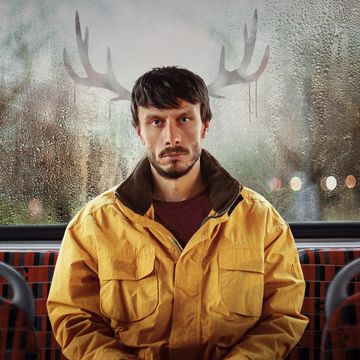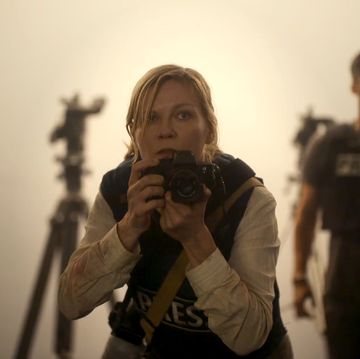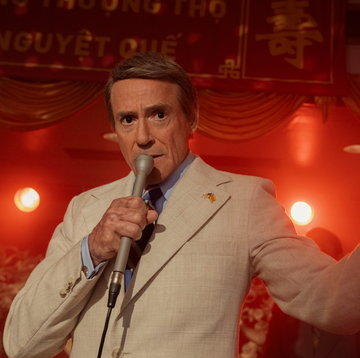It's 4:30pm in Florida when Marcus Luttrell calls. A born and bred Texan, this medically-retired Navy SEAL is over in the sunshine state for a three-week stint in physical therapy, and has just wrapped up.
“I've been down here for 20 days," he says. "I have to come here twice a year just so I can walk correctly."
How's it all going? "Pretty good! Pretty good," he says buoyantly. "I've been coming here since I got hurt and they do a great job of keeping me walking straight and living a semi-productive life."
Luttrell sustained a slew of near-fatal injuries during his service, as well as experiencing the deaths of best friends and team-mates. In 2005, while on a reconnaissance mission in the Afghan mountains, 19 SEALs were ambushed and killed; Luttrell survived by sheer force of spirit, strength and luck, when, having been found half-dead by some Afghani villagers, he was taken in by them and protected from the Taliban.
It's little surprise that his story has been turned into a Hollywood film, but it's a relief that that film is great. One of the things motivating Luttrell to keep himself alive during his ordeal was the determination to recount what had happened on that mountain, to inform the world of his teammates' bravery.
In 2007 his memoir of the events, Lone Survivor, was published, and director Peter Berg's cinematic adaptation has just been released in the UK. Luttrell has given the media enough of his soul over the past few years, promoting his book and, to some extent of late, the film, but nevertheless one feels obliged to tread carefully.
In video interviews online you can see his traumas hanging heavy over him; he often seems exhausted having to relive it all again while interviewers pummel him with questions. Regardless of his buoyancy when he calls, I can't bring myself to have him go through it yet again, and I tell him so upfront.
"Well that's great to hear," he says, audibly relieved. "Because the last interview I did, the guy was asking me, 'What was it like to watch your teammates die?' 'Did it hurt when you got shot?' Stuff like that. I said, 'Sir – really? Come on. I don't wanna come across as mean, but you already know the answers to these questions.'"
He's on good form, happy to discuss how he's doing and how he's moving forward. But this is one of the last interviews he'll be doing for the forseeable future and he's glad for that. 'Things are slowing down and getting back to normal,' he writes on Facebook the day after we talk. 'It's good to be back to a regular farm boy.'
***
Men of Honour: Luttrell, third from right, with his Navy SEAL team
Luttrell was born in Houston in November 1975, and was raised on his parents horsefarm near Oklahoma. His father, a former Navy gunner in Vietnam, was a man's man who taught his children to live off the land; together, Marcus and his twin brother Morgan learnt how to build shelters, to fish, to shoot, to scuba, and to kill, butcher and roast wild boars. Alligators were wrestled.
Mr Luttrell extolled the virtues of Navy SEALs, the best of the best, and Marcus wanted to be one from the age of 12. He began unofficial training with a former soldier at 14 and at 25, in 2001, he became a SEAL.
Deployed to Afghanistan in 2005, he had a bad feeling about Operation Red Wings from the start. A reconnaissance mission to observe a village and locate Ahmad Shah, a fundamentalist leading a cell against coalition forces, it required a four-man team: Luttrell, Petty Officer and medic; Lieutenant Michael Murphy, in charge of the operation on the ground; Sonar Technician Second Class Petty Officer Matthew 'Axe' Axelson, an eagle-eyed sniper; and Gunner's Mate Second Class Danny Dietz, Jr, a communications officer and spotter.
Under cover of darkness on June 27, an MH-47 Chinook dropped them off on a ridge near the Sawtalo Sar mountain. 'What I couldn't see was a place to hide,' wrote Luttrell in his book, regarding the rough, stony landscape. Prior to commencing the operation, he'd looked at the maps and was disconcerted.
'We did not have good intel on the vegetation. It was obviously bad and barren way up there in the Hindu Kush, around 10,000 feet.' Shortly after beginning a four-mile trek in the sodden mud and freezing rain, Luttrell's fears were realised, as they became 'starkly silhouetted against a treeless mountain above a Taliban-occupied village,' the moon casting their shadows into the slope.
After a night of no sleep, as they lay in a rocky shale, heat stifling them as they looked down on the village, the four SEALs suddenly found themselves face to face with three turbaned goat herders. Luttrell was peering through his binoculars when the first one appeared from nowhere, jumping off a log above Luttrell and landing right in front of him.
Luttrell spun his rifle at the goatherder while Axe took aim from another angle. The other two herders then appeared, followed by a hundred or so goats, bells jangling around their necks. They insisted they weren't Taliban, and were unarmed. As such, rules of engagement dictated that the SEALs were not to harm them.
They weighed up their options. Shoot them, get heard, have the villagers come to search for them, and face the wrath of the media and potential murder charges/jail; tie them up and leave them to die; or let them go and risk 'military suicide' as the goatherders alerted Ahmad Shah of their presence. They attempted to radio for advice, but comms were down. They decided to turn them loose.
Luttrell has since said he bitterly regrets that decision, for it was to cost the lives of many. Within a couple of hours, dozens of heavily armed Taliban fighters emerged on a hill. One then appeared behind a tree in front of Luttrell, who blew his head off, beginning a three-hour gunfight involving a barrage of AK-47 bullets from all sides.
With the SEALs boxed in, they needed to give up the higher ground. Murphy ordered them to “Fall back,” which meant jumping off a mountain, hurling themselves down a sheer drop. Luttrell took a sideways step, attempting to zigzag, but fell headlong, flipping in the air, hurtling down as he tried and failed to grab branches and get a foothold.
His supplies, helmet and gear were ripped away from him as he backflipped, the others soon following suit in similar fashion, crashing through the boulders as Luttrell landed, breaking his back. Murphy was shot in the stomach, Dietz in the hand. They were still being fired at as they continued to defend. Dietz was shot in the neck, still firing as blood poured out. An RPG smashed into a tree next to Luttrell, blowing him off the cliff. He landed semi-conscious, breaking his nose.
The fight continued as the Taliban descended on them. Dietz was shot again, and continued firing as Luttrell dragged him to cover. Dietz died in his arms.
Axe and Murphy were both shot in the chest, then Axe was shot in the head. In a suicidal bid to get back-up, Murphy moved himself to open ground, sitting on a rock to get satellite phone reception and call the Quick Reaction Force two mountain ranges away in Asadabad.
"My guys are dying out here... we need help," he pleaded. He finished the call with "Roger that, sir. Thank you," as two rounds were fired into his torso. Still he continued firing, screaming, "Help me, Marcus! Please help me!" That, says Luttrell, was his breaking point. He could barely walk, and if he had attempted to reach Murphy, would have been shot instantly. He dropped his gun and covered his ears as Murphy screamed out to him.
Then there was silence. 'I moved slightly forward and looked up there, in time to see four of them come down and fire several rounds into his fallen body,' wrote Luttrell.
'The screaming had stopped. For everyone except me. I still hear Mikey, every night. I still hear the scream above all other things... For several weeks I thought I might be losing my mind, because I could never push it aside. There were one or two frightening occasions when I heard it in broad daylight and found myself pressed against a wall, my hands covering my ears.'
Luttrell picked up his rifle and ran over to Axe, who had crawled under a rock. "Marcus, they got us good, man,” he said. “You stay alive, Marcus. And tell Cindy I love her.”
An exploding grenade then threw Luttrell some distance, knocking him out. He landed upside down in a hole. His trousers had been ripped clean off. His left leg, which was drenched in blood and full of shrapnel, seemed paralysed, his right one nearly as bad. The Taliban fighters, now unaware of his location, continued firing for some time before stopping. All he could do now was belly crawl. With no map, compass or medical gear, he began packing his wounds with mud.
Unbeknownst to Luttrell, yet more tragedy had befallen his team. In response to Murphy's call, 16 men had whipped over in a Chinook, but as it came to land near the original drop-off point, one of Shah's men fired an RPG through the helicopter's open ramp. All inside were killed as it smashed into the mountainside and broke up.
Luttrell, now crawling for his life through the night, couldn't speak, his throat full of dirt, his tongue sticking to the roof of his mouth. For hours he crawled, slid, climbed and fell, sucking at tree branches and grass blades for liquid.
Finally he found a waterfall, and managed a few desperate gulps before once again he saw a group of Afghans facing him.
He grabbed his rifle as one of them yelled at him, and he flicked off the safety catch. But then, desperate and defeated, he lowered his gun. They weren't Taliban, they told him, showed him they were unarmed, gave him water, and tended to his wounds.
He didn't know it at the time, but they were Pashtuns, the world's oldest living tribal group and, deciding to take him in, would now fight to the death to protect him. 'Lokhay warkawal,' it's called – a code of honour. They would shelter him, feed him and protect him. They picked him up and carried him to their village.
***
Gulab, the man who sheltered Luttrell, was targeted by the Taliban
"Good lord, that was rancid," laughs Luttrell today. Having been settled in one of the Pashtuns' houses, he was given some warm goats' milk. Despite his hunger, he took a sip and nearly vomited.
"To this day, if I even get a whiff of a goat... I was at a restuarant and someone had goats' cheese on the table, and good gosh: you wanna talk about a time in your life rushing back to ya... definitely."
One might think that if you were in that situation you'd ravenously gobble up whatever was put in front of you. But Luttrell just couldn't stand that goats' milk. "Ha!" he laughs again. "Right! 'No I'm good, I'd rather die.' It's pretty funny."
Having been taken in by the people he'd been out to kill for years, Luttrell was confused. Up to that point, he'd had no respect for the people of Afghanistan. I ask him how his experience with them changed the way he saw the world.
"Sure, that's a great point sir, absolutely," he says, the very picture of southern boy decorum throughout our conversation.
"The reason I had that animosity toward the Afghani people is because I just trained that way, and war changes your perspective. The problem with our wars today is there's no uniform. It's not like you can just walk out and think this guy's good and introduce yourself, that doesn't work like that over there. Anybody is a threat. So you're always on your guard. It was definitely a tough pill to swallow when that village rescued me, because I'd tricked myself into thinking you had to watch all these guys and girls out there because they could potentially turn on you.
They show you kindness in the beginning, then you turn to walk away and they're shooting a gun at you. That's happened more times than I can even count. But yes sir, I have a great understanding now, and I try to tell people – a lot of people think we're at war with Afghanistan, but we're not, we're at war with the Taliban. The good Afghani people are caught up in the middle of it."
He was protected in that village for four days before, thanks to an emergency beacon he hung out of a window, the Air Force found him, but there can't ever have been a point where he fully trusted the situation. "Absolutely, yes sir," he says. "That never happened. Until I got out of there. That's when I realised the sacrifices they made."
Indeed, his main protector, a man named Gulab, was threatened by the Taliban, who bow to the Pashtuns. At one point they burst into the house in which Luttrell was hiding and spent six hours kicking, punching and interrogating him.
Gulab was told: "You will die. Your brother will die. Your cousins will die. Your whole family will die. It's not worth it. Give us the American." He didn't, and has since had to go into hiding himself. He's had his house burnt down and a cousin killed. But he doesn't for one moment regret protecting Luttrell, and the two maintain a close friendship.
"We're brothers," says Luttrell. "I'm a member of that village, and I'm a member of that family just like he's a member of my family now. I mean, I owe him a life debt. He has a lot of added stress, the Taliban weren't trying to kill him before I walked in there, and they are now, there's a bounty on his head. But he's not afraid. He's been fighting in wars since he was a kid. He's just a strong man."
Luttrell alongside Lone Survivor director Peter Berg and star Mark Wahlberg
Not covered in the book or film is Luttrell's headstate during those four days in the village (Sabray). Half-dead, forced into trusting these people, let alone the Taliban surrounding the village and threatening them all, one can only imagine that extra layer of stress, not knowing what was around the corner at any given moment, or who might do what.
"Yes sir," he says. "We didn't talk about it in the book, you don't see it in the movie, and it's kind of crazy that you picked up on that. The mental stress that I was going through every second of every day out there was... just imagine your adrenaline being up for five days straight. I crashed so hard once I got back."
Back home, Luttrell was reunited with his family, who, thanks to erroneous media reports, had believed him dead. Yet a year later, having been awarded the Navy Cross at the Oval Office by George W, he was back in the game: in Autumn 2006 Luttrell was redeployed in Iraq, and there, during a raid, had his knees blown out and his spine fractured.
He was medically-retired from duty in 2009. He married in 2010, and in 2011 his wife gave birth to their first child. They named him Axe.
During the section of his book in which he describes his SEAL training, which includes Hell Week – five days of no sleep and rigorous 20 hour days – Luttrell quotes one of his superiors, who tells him that the human body can withstand almost anything – it's the mind that needs to be conquered.
This makes a lot of sense when you read of how Luttrell stayed alive on that mountain, crawling on his belly with a broken back, losing blood with a leg full of shrapnel. Without that training and that SEAL spirit, it's likely he wouldn't have made it.
"Oh yes sir," he agrees. "Absolutely. I fell back on all of my training to get through all that I went through out there during that week. My SEAL training was the best thing that had happened to me. Hell Week was five days long, so I knew I could hang on for five days no matter how bad it got. Probably more than five days. It's one of those things where we manipulate the mind into tricking the body that you can accomplish anything just as long as you keep getting back up. And that's all I did sir, really, I just kept getting back up. I wouldn't lay down and quit."
Something else which kept him alive was the determination to tell the world of his teammates, to ensure their courage was fittingly commemorated.
Lone Survivor was published a mere two years after his ordeal, and he sees the film as the end of that particular mission. Peter Berg, whose father was a marine in the Korean War, grew up idolosing Navy SEALs, and fought hard to convince Luttrell that he was the director to make the film (there were many offers on the table).
Luttrell was understandably apprehensive about what Hollywood might do with his story, and spent substantial time sizing up Berg, initially meeting him back in 2007.
“It took a while,” Berg tells Esquire Weekly in a London hotel suite. “Marcus doesn't just kiss ass and give you his trust and his blessing. He was very concerned that whatever filmmaker he ended up giving the rights to would listen to him, and would do the work that he felt was needed to learn about that culture.”
Luttrell moved in with Berg for a month as the two got to know each other. “We didn't only talk about the story, we went out, hung out, ran around town,” remembers Berg.
“I think he wanted to get away from Texas, where he was constantly reminded of his dead brothers. He was living in a home that was almost like a mausoleum, it had a gravestone in the middle of the living-room with the names of all the soldiers who were killed, and pictures of all of them. I think he wanted to get out of there, and my house gave him an opportunity to do that.”
Luttrell was involved with the film every step of the way, and Berg invited him to assemble a small team of SEALs to train the key cast (Mark Wahlberg as Luttrell, alongside Taylor Kitsch, Ben Foster and Emile Hirsch) on a three-week bootcamp.
“He put together a group of five to seven guys that he knew that were all very tight with the soldiers who were killed,” says Berg. “Marcus trusted them to help spread the word and teach our actors.”
The only time Berg requested that Luttrell stay away from the production was during some of the gorier scenes. “I wasn't sure how he would react to it,” he explains.
“Marcus has dealt with classic survivor's guilt and post-traumatic stress. He's had 15 surgeries since he's been back, he's got a traumatic brain injury, he's still dealing with the effect of the concussions. He'd doing well but I didn't want to be responsible for reactivating trauma in him. So for when we were filming some of the more violent scenes I just didn't see the upside of having Marcus on the set, and he agreed with me.”
Director Berg goes through a scene with Wahlberg, who plays Luttrell in the film
Indeed, Luttrell was affected by those scenes when he saw them. “He blessed the film, he said it was very accurate,” says Berg, “and he said it wasn't traumatising for him because he really went through it. What he's seen, a film will never equal. But he said the hardest part for him was watching Ben Foster, as Matt Axelson, die, because he wasn't there for that. He never knew what really happened to Matt Axelson, so seeing that, he said, was tough.” (Berg pieced together such information from after-action reports and autopsy reports.)
Luttrell likes the film, but he won't watch it again. “I play it all over in my head a million times, going through it in real life," he says. "The actors did a great job, and I hope people go and watch it and it resonates with them. But it's different for me, obviously."
He's happy to be finally done with it. "I didn't have very much press for the film, we left all that up to the Hollywood people," he says. "But yes sir, it's winding down for me, and I'm thankful for that."
Has the film helped him to move forward? "Yes, now that it's out, my teammates will forever be immortalised, and that's all I ever really wanted," he says. "So, I'm done."
Lone Survivor is out now.
This article first appeared in Esquire Weekly, our new iPad-only edition. Containing 100 per cent new and original content, it’s published every Thursday on the Apple Newsstand.
***
MORE LONG READS:
The Battle For The Internet's Future
Kenneth Anger: Where The Bodies Are Buried
Facebook At 10: The Case For The Defence
***













